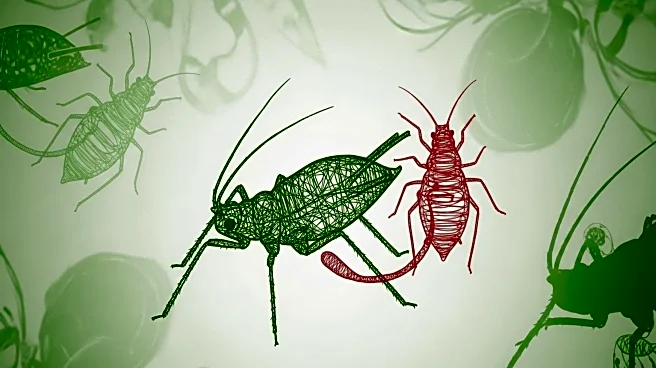What is the story about?
What's Happening?
A recent study has explored the genetic variability among isofemale lineages of the aphid species Myzus persicae, focusing on their resistance to parasitization by the parasitoid Diaeretiella rapae. The research highlights significant phenotypic variation within these lineages, which are clones of their mothers due to parthenogenesis. The study found that genetic factors, including small genomic structural variants such as SNPs and InDels, play a crucial role in modulating the aphid's immune response to parasitoid attacks. These genetic variations are linked to stress signaling pathways and developmental processes, influencing the aphid's ability to resist parasitization. The presence of secondary symbionts like Rickettsia was also examined, although their role as defensive agents remains inconclusive.
Why It's Important?
Understanding the genetic basis of aphid resistance to parasitoids is vital for developing effective biological control strategies. The phenotypic variability observed suggests multiple resistance mechanisms, which could complicate control efforts. Identifying genetic markers associated with immune response genes offers potential targets for reducing aphid defenses. Additionally, the study suggests that manipulating symbionts like Rickettsia, which increase fecundity without affecting resistance, could be a promising strategy. These insights are crucial for tailoring biological control methods to specific environmental contexts, potentially improving the sustainability and effectiveness of pest management.
What's Next?
Future research is needed to further explore the genetic and epigenetic factors influencing aphid resistance to parasitoids. Studies focusing on transcriptomics and epigenomics could provide deeper insights into the defense mechanisms evolved by aphid lineages. Additionally, understanding the role of environmental factors, such as host plant quality and temperature, in shaping these interactions will be essential for developing adaptive control strategies. Investigating the contribution of secondary symbionts like Rickettsia to aphid fitness and resistance will also be important for refining biological control approaches.
Beyond the Headlines
The study highlights the complexity of aphid-parasitoid-symbiont interactions, emphasizing the need for a multifaceted approach to pest management. The energy costs associated with immune responses can affect life history traits such as fecundity and longevity, presenting trade-offs that must be considered in control strategies. The findings underscore the importance of integrating genetic, environmental, and symbiotic factors in developing comprehensive pest management solutions.















